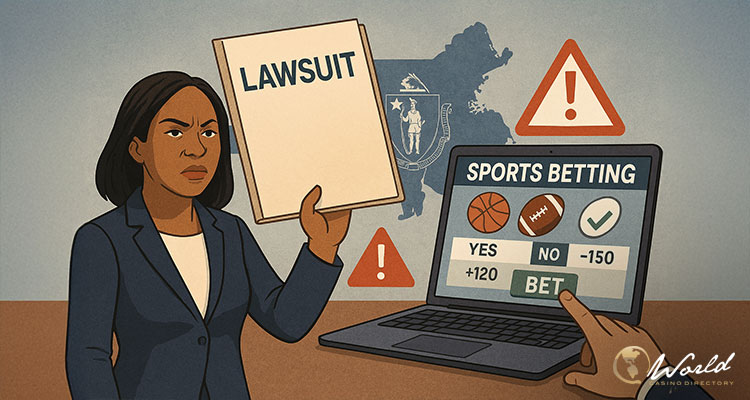Massachusetts Attorney General Andrea Joy Campbell has filed a lawsuit against KalshiEX LLC, accusing the online prediction market platform of unlawfully offering sports wagers to Massachusetts residents. The lawsuit, filed in Suffolk Superior Court, claims that Kalshi has been promoting and accepting sports bets under the guise of “event contracts” without the required licensing from the Massachusetts Gaming Commission (MGC). The suit asserts that the company has failed to comply with Massachusetts’ strict regulations governing sports gaming, including laws that require operators to obtain a license from the MGC.
In a statement, Attorney General Campbell emphasized the importance of tightly regulating sports betting due to the significant risks associated with addiction and financial loss. “Sports wagering comes with significant risk of addiction and financial loss and must be strictly regulated to mitigate public health consequences,” said Campbell. “This lawsuit will ensure that if Kalshi wants to be in the sports gaming business in Massachusetts, they must obtain a license and follow our laws.”
The Alleged Violation: “Event Contracts” Used as a Backdoor for Sports Betting
Kalshi operates a platform that allows users to place bets on the likelihood of specific events occurring, often through “yes” or “no” options. These “event contracts” are advertised on the platform for a variety of sports, including moneyline bets, point spread wagers, and over-under contracts, all of which closely resemble traditional sports bets offered by licensed operators. The platform’s marketing efforts, including advertisements on social media and television, actively promote these betting options to consumers in Massachusetts.
However, Kalshi’s approach has raised concerns among regulators. The Attorney General’s Office (AGO) alleges that the company is circumventing Massachusetts’ stringent licensing requirements for sports betting by presenting sports wagers as “event contracts.” This move allows the platform to avoid the oversight required of licensed sports betting operations in the state.
As a result of Kalshi’s actions, the AGO has requested that the court issue an order to cease the company’s sports wagering activities in Massachusetts while the lawsuit is ongoing. The AGO also contends that Kalshi has not applied for, nor received, a Massachusetts sports wagering license, which is a legal requirement under state law.
Consumer Protection Concerns: Age Restrictions and Responsible Gambling Tools
The lawsuit also highlights several consumer protection issues tied to Kalshi’s platform. According to the AGO, the company allows users as young as 18 to place wagers on its site, despite the legal age for sports wagering in Massachusetts being 21. Additionally, Kalshi has been accused of failing to implement necessary safeguards to protect bettors. Unlike licensed operators, Kalshi has not provided appropriate self-limiting options, such as caps on maximum deposits or wagers, nor has it offered educational resources on the risks of gambling. This lack of responsible gambling tools stands in stark contrast to the protections mandated for licensed operators in the state.
Jordan Maynard, chair of the Massachusetts Gaming Commission, voiced his concern about the growing trend of prediction market platforms expanding into sports betting. “Prediction market companies are expanding into sports wagering while neglecting age restrictions, player protection programs, state taxes, and other consumer protections. My fellow commissioners and I appreciate the Attorney General’s efforts to enforce the law and hold these companies accountable to Massachusetts’ rigorous standards,” said Maynard.
In its defense, Kalshi has argued that its event contracts are distinct from traditional sports betting. The company has emphasized that its platform operates under the oversight of the Commodity Futures Trading Commission (CFTC), which regulates prediction markets at the federal level. Kalshi also claims that the CFTC’s federal authority supersedes state regulators, positioning itself as operating within the bounds of federal law rather than state-specific gambling statutes.
Kalshi has faced similar legal challenges in other states. The company has received cease-and-desist orders from multiple states, including Arizona, Illinois, Montana, and Ohio, and has been involved in ongoing litigation in states like New Jersey, Maryland, and Nevada. In some instances, Kalshi has successfully defended its operations, as in New Jersey, where it appealed a cease-and-desist order. However, the Massachusetts case represents a significant new chapter in Kalshi’s legal battles.
Kalshi’s rise has fueled a broader debate about the regulation of prediction markets, especially as they expand into sports betting. While traditional sportsbooks have long operated under strict state regulations, platforms like Kalshi argue that they offer a different kind of product—one where users trade bets against each other rather than against the house. This distinction has become a central point in Kalshi’s legal defense, as it attempts to carve out a niche for prediction markets in the growing sports betting industry.



